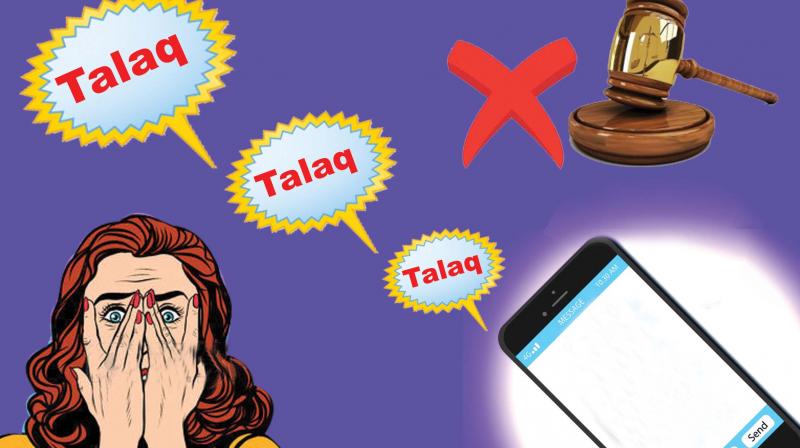Talaq' done with, for now
Equally Talaq itself is not a recommended action and, therefore, Triple Talaq will not fall within the category of sanction ordained by Quran.

New Delhi: The Supreme Court’s verdict ruling the practice of divorce through triple talaq among Muslims as "void", "illegal" and "unconstitutional" came with a clause. While Chief Justice J.S. Khehar and Justice S. Abdul Nazeer were in favour of putting on hold for six months the practice of triple talaq, it has asked the government to come out with a law in this regard less the injunction cease to operate. A brief outline on the majority and minority views of the top court.
Majority view
Justice Nariman said Triple Talaq does not fall within the sanction of Holy Quran. Even assuming that it forms part of the Quran, Hadis or Ijmaa, it is not something “commanded”. Equally Talaq itself is not a recommended action and, therefore, Triple Talaq will not fall within the category of sanction ordained by Quran. Though permissible in Hanafi jurisprudence, yet, that very jurisprudence castigates Triple Talaq as being sinful. Justice Nariman said what is manifestly arbitrary is obviously unreasonable and being contrary to the rule of law, would violate Article 14 of the Constitution. If an action is found to be arbitrary and unreasonable, it would negate the equal protection of the law contained in Article 14 and would be struck down on this ground.
Pointing out that triple talaq is sanctioned under the Muslim Personal Law (Shariat) Application Act, 1937, Justice Nariman said it is constitutionally invalid. He said “Divorce breaks the marital tie which is fundamental to family life in Islam. Not only does it disrupt the marital tie between man and woman, but it has severe psychological and other repercussions on the children from such marriage.” Justice Kurian Joseph supporting Justice Nariman’s judgment said what is held to be bad in the Holy Quran cannot be good in Shariat and, in that sense, what is bad in theology is bad in law as well. Merely because a practice has continued for long, that by itself cannot make it valid if it has been expressly declared to be impermissible. The whole purpose of the 1937 Act was to declare Shariat as the rule of decision and to discontinue anti-Shariat practices with respect to subjects enumerated in Section 2, which include talaq. Therefore, in any case, after the introduction of the 1937 Act, no practice against the tenets of Quran is permissible. Hence, there cannot be any Constitutional protection to such a practice.
Minority view
The CJI said the practice of ‘talaq-e-biddat’ being a constituent of ‘personal law’ has a stature equal to other fundamental rights, conferred in Part III of the Constitution. The practice which is in existence and accepted by all for over 1,400 years cannot therefore be set aside, on the ground of being violative of the concept of the constitutional morality, through judicial intervention. Reforms to ‘personal law’ in India, with reference to socially unacceptable practices in different religions, have come about only by way of legislative intervention.
The CJI however, stayed the operation of triple talaq for six months. He said till such time as legislation in the matter is considered, we are satisfied in injuncting Muslim husbands, from pronouncing ‘talaq-e-biddat’ as a means for severing their matrimonial relationship. The instant injunction, shall in the first instance, be operative for a period of six months. If the legislative process commences before the expiry of the period of six months, and a positive decision emerges towards redefining ‘talaq-ebiddat’ (three pronouncements of ‘talaq’, at one and the same time) – as one, or alternatively, if it is decided that the practice of ‘talaq-e-biddat’ be done away with altogether, the injunction would continue, till legislation is finally enacted. Failing which, the injunction shall cease to operate, the CJI added.

